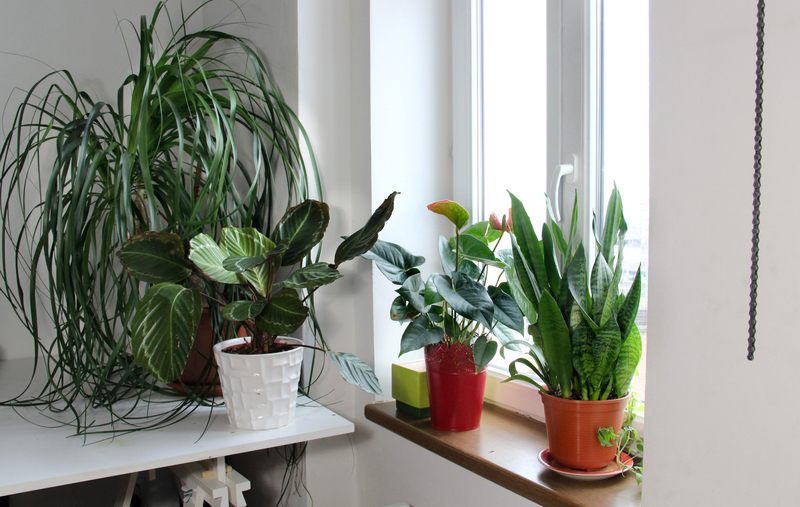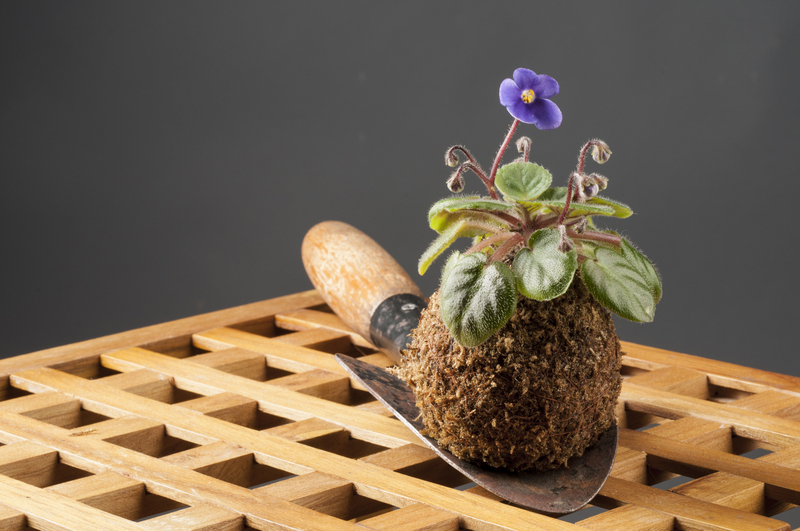Master the Art of Weed Control with These 3 Handy Tips
Posted on 08/09/2025
Master the Art of Weed Control with These 3 Handy Tips
Are unsightly weeds taking over your cherished garden or carefully maintained lawn? If you're looking to master the art of weed control, you're in the right place! These pesky plants rob your desirable plants of essential nutrients, water, and sunlight, reducing the beauty and vitality of your outdoor spaces.
But don't worry: effective weed management is absolutely achievable. This comprehensive guide will equip you with three powerful tips for weed control that really work, ensuring your flower beds, vegetable patches, and lawns stay lush and weed-free. Read on, and discover how to maintain a pristine landscape without endless pulling and frustration!

Understanding the Importance of Effective Weed Control
Before diving into actionable strategies, it's essential to understand why weed control matters. Weeds aren't just unsightly: they compete directly with your desirable plants for water, nutrients, and sunlight, threatening the health and yield of your garden or turf.
- Reduced Plant Competition: Weeds steal precious resources from your preferred plants, often outcompeting them for survival.
- Pest and Disease Increase: Weeds can harbor pests and diseases, spreading them to your garden plants.
- Decreased Curb Appeal: An overgrown weedy garden detracts from the beauty and value of your property.
- Seed Bank Proliferation: If allowed to go to seed, weeds will multiply quickly and return even stronger next season.
To conquer unwanted vegetation and enjoy a thriving, healthy landscape, proactive weed management is a must. Let's explore the three handy tips for mastering weed control that every gardener or homeowner should follow.
Tip 1: Prevent Weeds with Mulching
Why Mulching is a Weed's Worst Enemy
Mulching is one of the most effective and natural ways to control weeds in your lawn or garden. By applying a thick layer of mulch, you create a barrier that blocks sunlight, discouraging weed seeds from germinating in the first place.
Benefits of Mulching:
- Suppresses weed growth by excluding light
- Retains soil moisture for healthier plants
- Improves soil structure and adds organic matter
- Regulates soil temperature, protecting roots
How to Mulch for Best Weed Control Results
To maximise weed suppression with mulch:
- Clear the area of existing weeds. Pull or hoe out as many weeds as possible before mulching.
- Apply a layer of organic mulch. Use 2-4 inches of shredded bark, wood chips, straw, pine needles, or compost. Inorganic mulches (like landscape fabric or gravel) can also be used in some areas.
- Keep mulch away from plant stems. This prevents rot and fungal issues in your garden plants.
- Refresh mulch annually. Organic mulch will break down over time, so replenish it each year to maintain effectiveness.
Well-mulched beds and borders will remain largely weed-free and require far less hands-on weeding through the growing season. For lawn weed control, consider using a mulch mower, which returns clippings to the soil, shading out weed seeds.
Tip 2: Practice Timely and Targeted Weeding
The Value of Persistent, Proper Weeding
No matter how proactive you are, some weeds will inevitably appear. The key to controlling problem weeds is to act quickly and consistently. Remove weeds while they're young, before they have the chance to flower and set seed.
- Early Removal: Young weeds are easier to pull, and their shallow roots haven't yet spread.
- Prevent Seed Spread: Don't let weeds reach maturity and drop hundreds of seeds for next year.
- Stay Vigilant: Make weeding a regular habit--just a few minutes a week can dramatically reduce your weed problems.
Best Weeding Tools and Techniques
- Hand-pulling: Works well for larger weeds and those growing close to desired plants.
- Hoeing: Use a sharp hoe to cut off young weeds at the soil line before they establish deep roots.
- Weed forks and diggers: Useful for tap-rooted weeds (like dandelions and dock).
- Scuffle hoes (Dutch hoes): Ideal for quickly cultivating between rows in vegetable gardens.
Tip: Try weeding after a rain, when soil is soft and roots come out more easily. If it's dry, use a hand fork or trowel to minimize root breakage.
Techniques for Persistent, Organic Weed Management
- Spot weeding: Target weedy patches as soon as you spot them. Don't let "just one weed" turn into a big patch.
- Use ground covers: Plant low-growing, dense ground covers in empty spaces to outcompete weeds naturally.
- Mow regularly: Keeping your lawn at the correct height (generally 3 inches) shades out weed seeds and prevents germination.
Stay consistent and vigilant, and you'll be rewarded with weed-free, flourishing garden beds and lawns throughout the season--and you'll prevent the creation of a persistent seed bank for years to come.
Tip 3: Use Chemical and Organic Weed Controls Wisely
When and How to Use Herbicides Safely
Sometimes, even the most diligent gardener faces tough, invasive weeds that require a more aggressive approach. Modern herbicide products--both chemical and organic--can be valuable tools, but it's crucial to use them responsibly:
- Selective herbicides: These target specific weed types (like broadleaf weeds in lawns) without affecting grasses.
- Non-selective herbicides: Effective on all plants--use with caution and only on areas where you want a clean slate (driveways, walkways, or before establishing new beds).
Important: Always follow label instructions precisely. Applying more than recommended can harm soil health, pollinators, and desirable plants.
Natural and Organic Alternatives to Chemical Weed Killers
Want to control weeds without harmful chemicals? There are effective organic and natural options:
- Boiling water: Pouring boiling water directly onto weeds (especially in cracks and paving) scorches and kills them instantly.
- Vinegar-based sprays: High-strength horticultural vinegar can be effective for small, young weeds.
- Flame weeding: Propane flame weeders scorch weed foliage in driveways and open soil areas.
- Corn gluten meal: This pre-emergent product inhibits seed germination and is safe for established lawns.
Note: Organic controls tend to work best on young, actively growing weeds. Persistence and repeated applications may be required for tough perennial weeds.
Additional Weed Control and Prevention Tips
Boost Your Weed Control Success with These Practices
- Feed and water your plants well: Healthy, vigorous plants are better able to outcompete weeds.
- Plant densely: Close spacing of garden plants shades soil and reduces weed germination.
- Keep garden edges tidy: Weeds love neglected corners and fence lines--mulch or plant ground covers here.
- Rotate crops: In vegetable gardens, moving crops each year prevents a build-up of specialized weeds.
- Install landscape fabric: For problem areas, a layer of fabric beneath gravel or mulch stops weeds from rooting.
- Inspect new soil and plants: Always check for weed seeds or seedlings before introducing them into your garden.
By following these integrated weed management tips, you can enjoy a garden that's lush, beautiful, and low-maintenance--no matter what Mother Nature throws at you!

Frequently Asked Questions About Weed Control
What's the best time to weed my garden?
Weed early and often! The best time to weed is when the soil is moist (such as after rain or watering), and always before weeds have a chance to flower and set seed.
Can mulching really keep my garden weed-free?
Absolutely! Organic mulch (like bark or straw) blocks sunlight and smothers weed seeds. Remember to keep it at least 2 inches thick and top up as it breaks down.
Are chemical weed killers safe to use?
Modern herbicides can be effective but must be used carefully. Always follow product instructions, apply selectively, and consider the impact on pollinators and nearby plants. Where possible, combine chemical use with preventive cultural strategies for safer, more sustainable weed control.
Master the Art of Weed Control & Reclaim Your Garden's Beauty
With these three handy tips for weed management--mulching, timely weeding, and careful use of weed controls--you can finally master the art of weed control and ensure your garden, lawn, or landscape remains vibrant and weed-free all season long.
- Prevent problems with mulch and dense planting
- Keep on top of emerging weeds before they spread
- Use targeted treatments only when necessary
Ready to enjoy a weed-free landscape? Start integrating these tried-and-true weed control strategies today--and watch your outdoor space thrive like never before!
Share Your Own Tips!
Got a unique way to stop weeds in your garden? Share your favorite weed control tips in the comments and help fellow gardeners master this essential skill!
Latest Posts
Explore the top 9 fast-growing hedges for privacy solutions
Designing a Safe Haven for Kids in Your Backyard
Shielding Your Garden from the Wrath of Severe Weather

